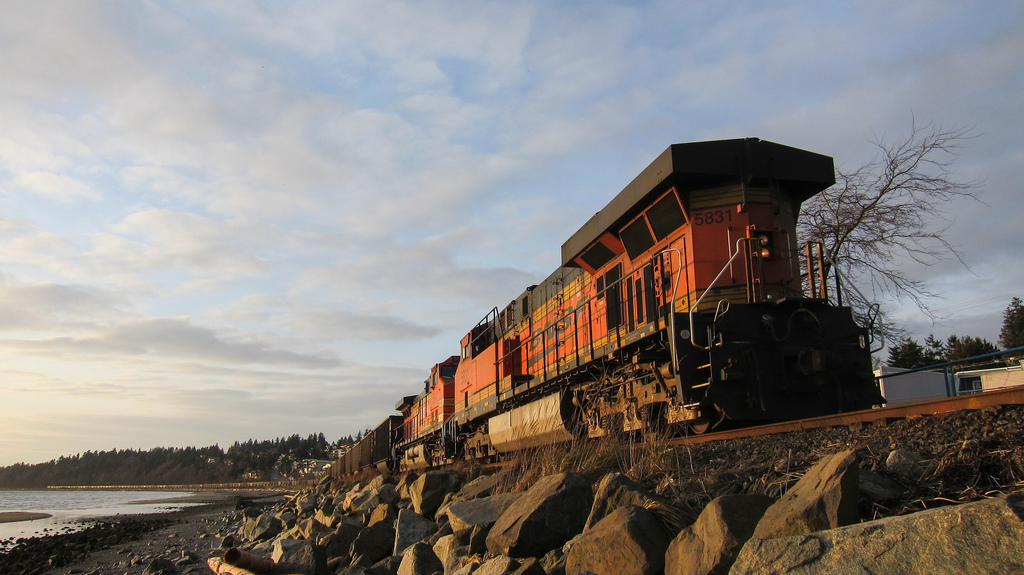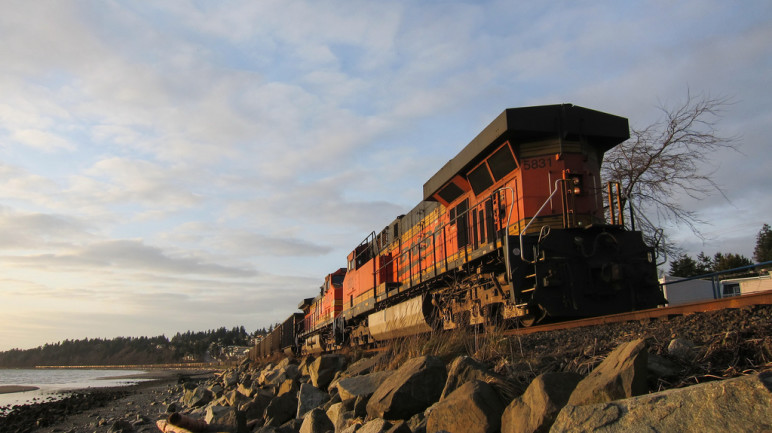BC residents took to the polls Tuesday to elect a new Parliament—and for fossil fuel exports a lot rode on the electoral outcome.
A win by the right-of-center BC Liberal Party could have spelled doom for BC coal exports, particularly from US companies shipping their wares through southern BC. Liberal leader Christy Clark had taken an unexpectedly strong stand against coal shipments to overseas power plants: she first sent a letter to federal Prime Minister Justin Trudeau asking for a complete ban on such exports, and later vowed to levy a prohibitively stiff fee on coal exports if the federal government didn’t act. The move was initially portrayed as little more than a bargaining chip in a trade dispute over softwood lumber import duties imposed by the Trump administration. But Premier Clark doubled down, claiming that she’d take action on coal exports even if the lumber duties were lifted. In short, a Liberal win would have been abysmal news for US coal companies hoping to ship coal to Asia.
On the other hand, a win by the New Democratic Party (NDP) would have created huge obstacles for oil and natural gas exports. Christy Clark’s put liquefied natural gas (LNG) exports at the center of the Liberals’ economic platform, despite the fact that collapsing LNG prices had rendered most of those projects uneconomic without significant government subsidies. Just so, Clark’s party had been supportive of Kinder Morgan’s proposed expansion of the Trans Mountain Pipeline, which could allow a massive increase in oil exports from Alberta’s tar sands. But the New Democrats actively opposed the Trans Mountain expansion, and could have derailed provincial LNG export projects as well. (Curiously, the NDP remained largely on the sidelines during the debate over US coal exports, going so far as to call Clark’s proposed export ban “reckless.”)
But as it turns out, neither of those two parties won a clear-cut victory: with 44 seats needed for a Parliamentary majority, the Liberals have won 43 seats, the New Dems 41 seats, and the Green Party holds 3 seats. And contrary to many media reports, this doesn’t necessarily mean that the Liberals have “won” a minority government. Instead, as this useful primer points out, there are at least 4 possible outcomes for this election. In at least two scenarios, the Greens—who oppose all fossil fuel exports—would in the position of being kingmakers in the new government, extracting significant major concessions from whichever party they partner with to form a majority government. So far, it appears that the Greens’ top priority is to get big money out of BC politics, but it’s at least conceivable that they could negotiate significant environmental concessions as well—perhaps winning blanket opposition to fossil fuel exports of all stripes. After all, Green Party leader Andrew Weaver has said that the Trans Mountain pipeline has “no place on our coast,” while dismissing the Liberals’ LNG-obsession as “nonsense.”
To throw more confusion into the mix, the vote count is incredibly close in some ridings (districts). In one riding, the NDP candidate is winning by just 9 votes, a margin that will trigger an automatic recount. If the New Dems lose that seat in the recount, it will be a 44-40-3 split and the Liberals will have a narrow majority. That would still be bad news for US coal exporters, but could mean a modest boost for the prospects of LNG projects and the Trans Mountain Pipeline.
Unfortunately, we’ll have to wait for a few weeks to know who will actually form the government. I’m afraid I’ll be on pins and needles for a while longer. But regardless of the precise outcome, I imagine that some would-be fossil fuel exporters will be mightily disappointed once the dust settles.











Jim Williams
I would not characterize the BC Liberal Party as “right of center.” Nationally and locally, the Liberals tend to be center-left and similar to our own Democratic Party.
Jim Williams
Tacoma, WA
Clark Williams-Derry
I respectfully disagree. The BC Liberals haven’t been affiliated with the national Liberal party since 1987. The federal Liberals are more like US Democrats, but the BC Liberals are, in my opinion, more like moderate New England Republicans in the 1980s and 1990s — today a nearly extinct breed, but at the time an important strain of the Republican party.
Clark Williams-Derry
CBC has a brief rundown on the history of the BC Liberal Party here: http://www.cbc.ca/news/canada/british-columbia/why-the-b-c-liberals-are-sometimes-liberal-and-sometimes-not-1.4100339
Jan
This particular Liberal government has been far to the right of Centre for the duration of office.
Al Lehmann
You are seriously mistaken. The BC Liberal Party is well right of center, more akin to Canada’s Conservative Party nationally than to its namesake national Liberal Party.
For evidence one might examine the tremendous corporate support financially for the BC Liberals, much higher than for their main opposition (the New Democratic party). The Green Party will not take either corporate or union donations.
Jan Steinman
Jim Williams, the BC Liberals are most certainly “right of centre,” and they are not affiliated with the national Liberal Party in any way except due to the unfortunate neglect of the federal Liberal Party for not taking out a trademark on the name.
The BC Liberals came out of the disgraced Social Credit Party, a very conservative party that so soiled its nest that they feared no one would ever vote for them again. So they gave themselves a shiny new, progressive-sounding name, and carried on with their conservative policies of privatization and sell-off of government services and resources, neglect for the underprivileged, union-busting, tax breaks for the rich, lax environmental regulation, attacks on farmland and ecological reserves, and blatant corporatization of everything.
This could still backfire, as there are “progressive Liberals” among that lot who have been openly critical of the party leadership, and should Courtney-Comox go Liberal in a re-count, there is still the possibility that one or more narrowly-elected neo-Liberals could jump ship — which happens much more often in Canadian politics than in US politics.
In short, these are historic times, of great intereste to political junkies, the likes of which BC has not seen is some 60 years!
Sarama
The B.C. Liberals are about as “Liberal” as Attila the Hun. As to their populist leader, Christy Clark, she only “found religion” on the thermal coal issue just two weeks before the election. Those of us fighting for the environment here, are hoping that the Greens can live up to their name, and start working together with the NDP, for social justice and protecting the environment.